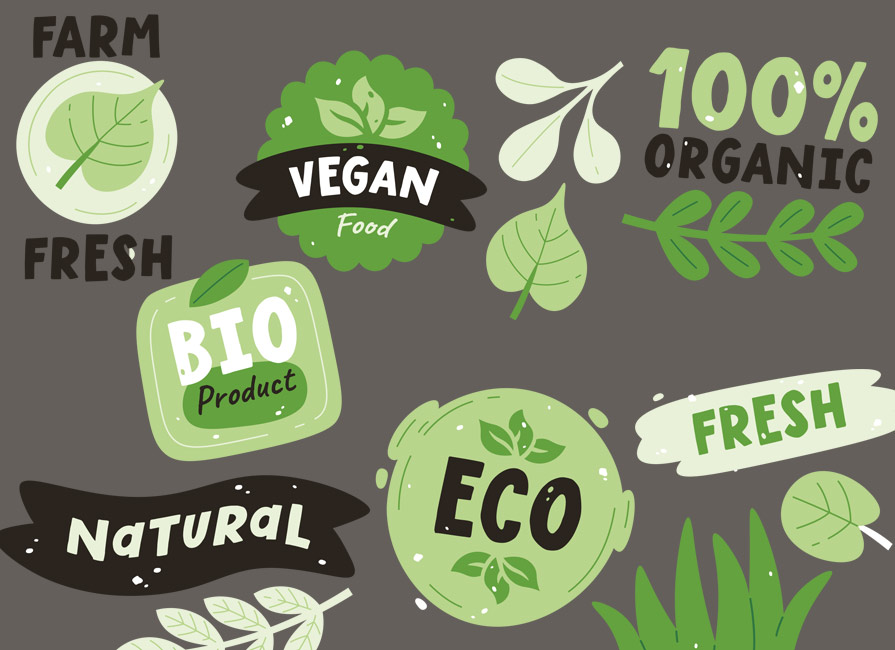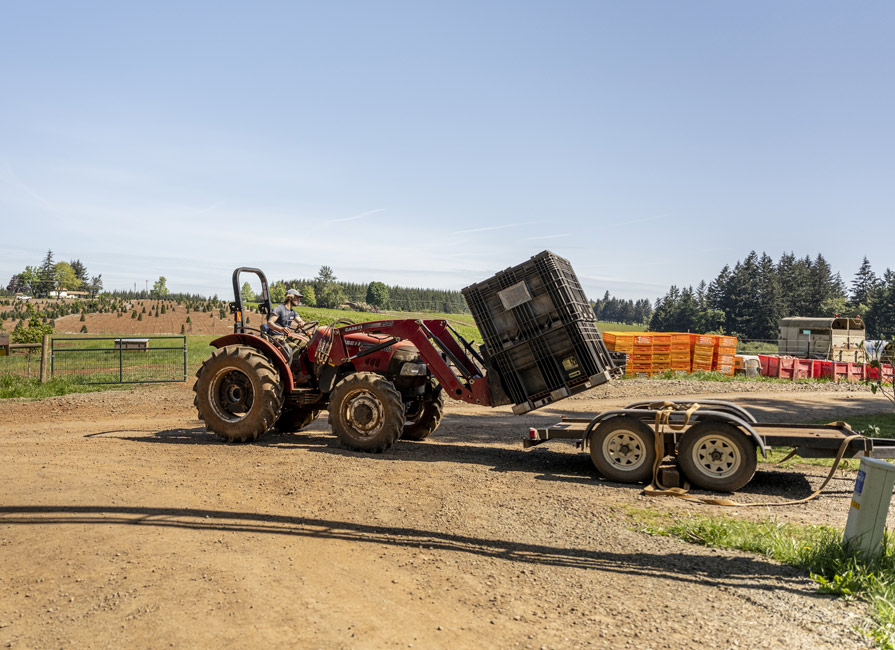One of the key attractions of our Certified Regenerative by AGW program is its practical…

Why Certify?
Organic. Cage-free. Certified grassfed. What do these food label claims really mean—and are any of them right for your business?
It is fair to say that more people than ever are curious about what is in their food and how it is produced. However, as less than 2% of the North American population live and work on farms, there is often a big information gap between public understanding and the realities of modern farming. Unfortunately, this gap is often filled by inaccurate and even misleading information.
Food labels matter
Alongside advertising, food labels are still the primary way most people get information and make day-to-day purchasing decisions about their food. But while federal laws require food labels to be “truthful and not misleading,” enforcement is inconsistent and in many cases hinges on whether a company follows its own definition of the claim being made.
As a farmer or food company, using label claims effectively can not only enable your products to stand out on the shelf, but will also help to educate potential customers about the benefits of your products and farming system—and ensure your products are appropriately valued. This article explores some of the most commonly used labels and how to determine whether a label claim or certification might be a good fit for your business.
Popular label claims
There are two main types of label claims: those that are independently verified (in other words, certified by a third party) and those that are not independently verified (self-made by the farmer or marketing company). Unless an independent third party verifies a claim, the integrity of a food label is only as reliable as the individual or company making it.
Verified claims
- Certified Animal Welfare Approved by AGW: Ranked as the highest-rated label by Consumer Reports when it comes to animal welfare, pasture-based farming, and sustainability, this certification requires high-welfare management, continuous pasture access for all animals, and high-welfare slaughter practices with pre-slaughter stunning.
- Certified Humane: This Certified Humane program does not require pasture-based management as a baseline but defines space requirements for animals. It also has an optional pasture-raised add-on label. Certified Humane doesn’t require pre-slaughter stunning for all species.
- Certified Organic: In general, organic production limits the use of conventional chemicals, pesticides, hormones, antibiotics, and other synthetic inputs. While modest improvements are underway, this label does not currently ensure high welfare or outdoor access for all species. Standards are written and maintained by the USDA National Organic Program.
- Genetically modified: While U.S. labeling regulation does not require the disclosure of genetically modified ingredients on food products, consumers may choose to avoid them for a variety of reasons, including environmental impacts and perceived health concerns. The two leading certifications dedicated to helping consumers avoid genetically modified ingredients are Certified Non-GMO by AGW and Non-GMO Project Verified.
- Grassfed certification: Well-known grassfed labels include American Grassfed Association, Certified Grassfed by AGW, and Organic grassfed add-ons, such as Pennsylvania Certified Organic and Organic Plus Trust. Each has its own standards to assure a grassfed feeding protocol. However, not all grassfed certifications encompass wider issues, such as animal welfare, routine antibiotic use, and environmental impacts.
- Regenerative: Arguably the fastest growing—and increasingly confusing—label claim. At present, there is no legal or regulated definition for the ‘regenerative’ claim. There is also no universally agreed definition within the industry for what regenerative actually means. Proponents often cite minimizing soil disturbance, integrating livestock, maximizing soil cover, rotational grazing, and lowering external inputs. Others believe regenerative should go further to improve ecosystems or to benefit farmers, animals, and communities. Unless the supplying farm has been certified by a third party, there is no way to know what farming system is involved and what farming practices are applied.
Two of the leading labels, Certified Regenerative by AGW and Regenerative Organic Certified, have publicly available standards that certified farmers and businesses must follow. Regular on-site inspections ensure these standards are being met.
Non-verified claims
- Cage-free: The common ‘cage-free’ label claim actually has no legal or regulated definition. While it implies animals are raised outdoors on pasture, this claim is highly misleading. For example, ‘cage-free’ chickens are often raised indoors in overcrowded, enclosed barns. It provides no assurance of high-welfare management or outdoor access, for example.
- Natural/All natural: One of the most misleading label claims. Numerous consumer surveys show most people think a ‘natural’ or ‘all natural’ label claim refers to how animals are raised. Yet a “natural” label, as legally defined by the USDA, applies only to how meat is processed after slaughter. In other words, ‘natural’ can simply mean that a product is minimally processed with no artificial ingredients. A ‘natural’ or ‘all natural’ label claim provides no assurance of high-welfare management or outdoor access, for example.
- Pastured/Pasture-raised: While a “pasture-raised” label claim implies animals were raised outdoors on pasture, it also has no legal or regulated definition. Unless the supplying farm has been certified by a third party that requires pasture-based or high-welfare management, there is no way of knowing which farming systems are involved.
Should you get certified?
It goes without saying that farm certification is not for everyone, nor is it always appropriate for every food or farming business. Certification can be a great fit for farmers who:
- Want to differentiate products in a consumer-friendly way.
- Source from other producers or sell as a group and want traceability and consistency of practices.
- Are comfortable keeping basic records and agree to regular on-site inspections (usually once a year).
- Sell into a commodity market that requires and/or pays a premium for certification.
However, certification may not be a good fit for producers who:
- Do not want to keep basic records or agree to regular on-site inspections.
- Buy and resell products without knowing the source or how they were produced.
- Primarily market on a selling point of direct-to-consumer relationships and have no interest in further differentiating their product.
- Sell into a commodity market that does not require or pay a premium for certification.
We believe farm certification has an important role to play in helping people make informed food purchasing decisions, as well as reconnecting consumers and food producers by encouraging—and rewarding—positive farm management changes.
It is important to remember that while certification can help to focus and reflect your core farming values and can significantly benefit any marketing plan, it is not a ‘silver bullet’ and will not automatically guarantee additional sales. While some certifiers (including AGW) offer marketing support, the value of any certification ultimately depends on how effectively you use it within the context of your market. Consider if you intend to use the logo on your certified products and marketing materials. What steps will you take to explain to your customers exactly what the certification means and how it complements their own values?
If you are interested in getting certified, start by reading the standards for the various programs you are interested and find out more about the different requirements, fees, and inspection protocols. Then, get in touch. They should be glad to hear from you and should be able to answer any questions you have.
For more information on AGW’s marketing and technical support services, visit agreenerworld.org/farmer-services/.
Are you considering Certified Animal Welfare Approved by AGW certification?
Six questions to ask yourself first …
- Does the label reflect my values and practices and set me apart in the market?
- Do I meet the standards? If not, am I willing and able to?
- Am I willing to keep basic farm records and host regular on-site inspections?
- If there is not a guaranteed price premium, can I effectively use the certification in my marketing to add value?
- What will it cost in time and money, and is this realistic for my operation?
- Can I commit to being certified for a few years to see if it adds value to my business?
If you are interested in getting certified by AGW, we would be happy to answer any questions. Email [email protected]
Author: Emily Moose is AGW’s Executive Director
Originally published in the Summer 2024 issue of AGW’s Sustainable Farming magazine.


